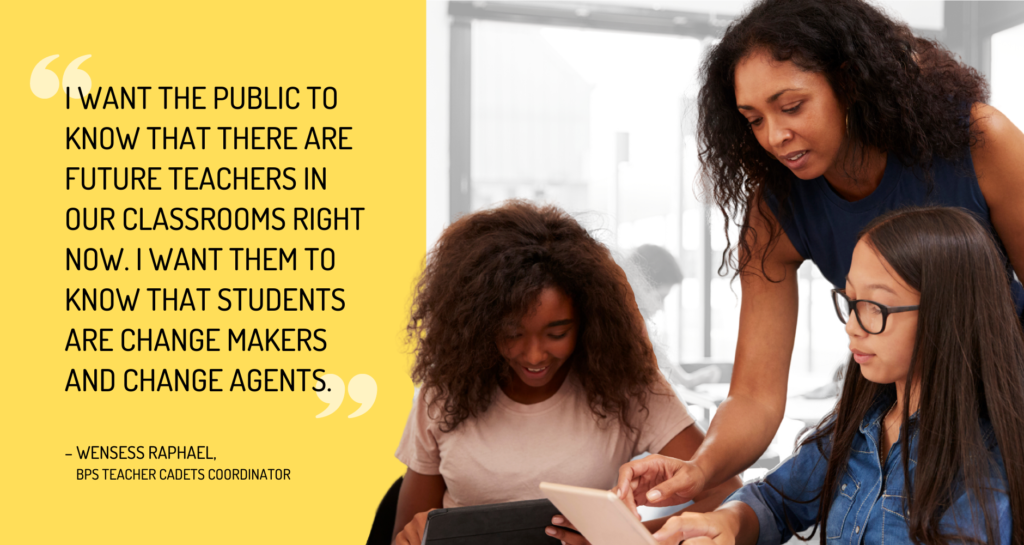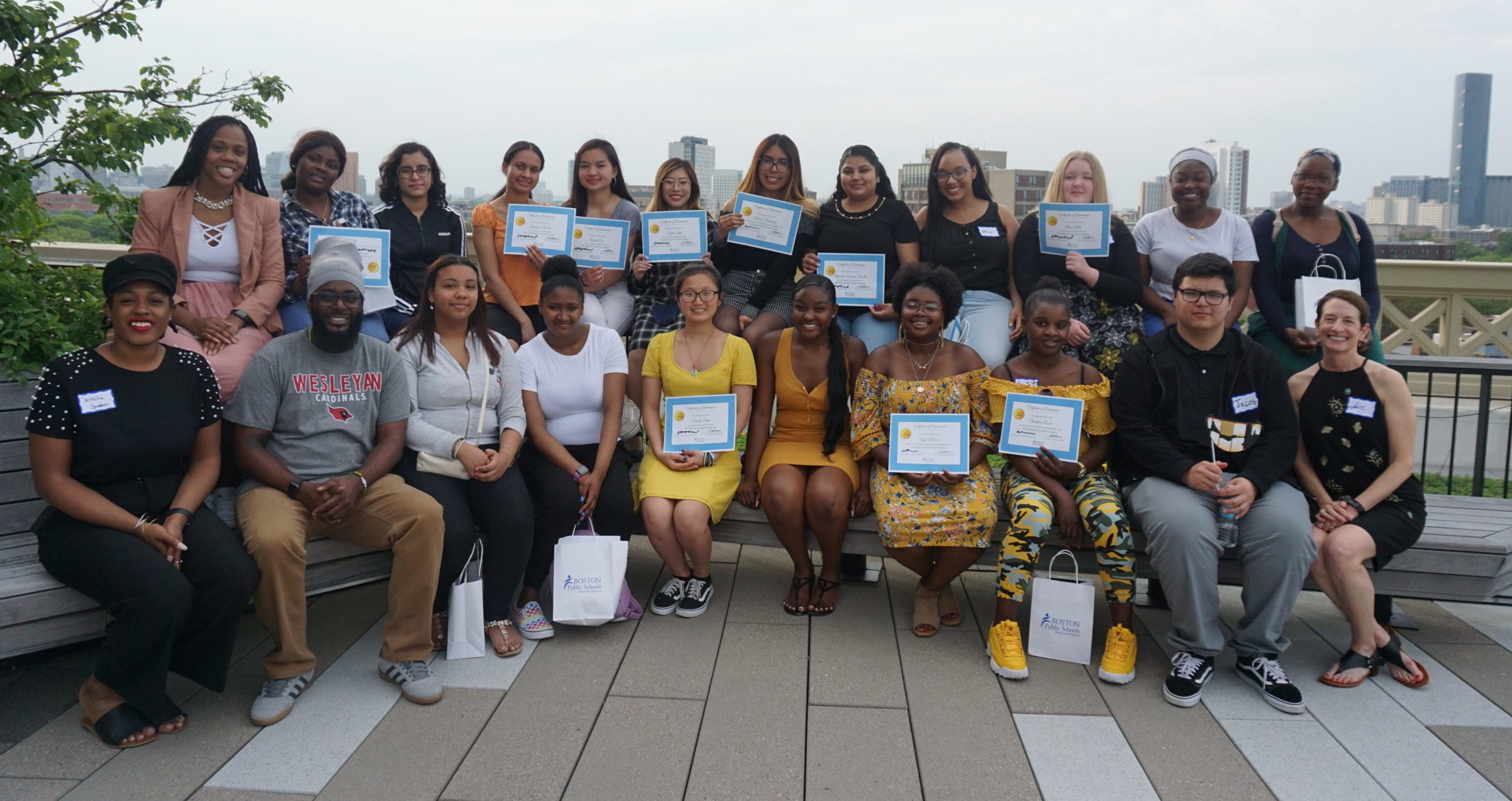
Boston Public Schools is one of the most diverse school districts in the country – nearly one in every two students speaks a language other than English at home, and students come from 139 different countries. One in five BPS students has a disability, and half are economically disadvantaged. It’s increasingly important to recruit teachers who reflect the experiences of those students.
The BPS Teacher Cadets program, formerly known as BPS High School to Teacher program, is one solution that the Boston Public Schools has created to inspire and enable future educators. Teacher Cadet’s mission is to identify middle school and high school students who have the potential to become future teachers and provide them with Education Mentors to support their journey.
Wensess Raphael, Coordinator of the BPS Teacher Cadets Program, explains that students sometimes have trouble envisioning themselves in the role of an educator. “They might see teaching as difficult or challenging or think they will have to be an authoritative figure in the classroom, telling others what to do – but that’s really not what teaching is about!” With a mentor’s guidance, students can get an inside look at the life of a teacher, and recognize their own potential.
The program welcomes students from as early as middle school, and students can join at any point during their secondary school career. The Teacher Cadets have a busy schedule – along with their core classes, they also focus on leadership skills and teacher preparation. Every year, Teacher Cadets are also assigned a different capstone project. By their senior year, students will have shadowed experienced teachers, facilitated after school clubs, created multiple lesson plans, and even designed a course.
Teacher Cadets have mentors to support them along the way, and the program encourages students to advocate for themselves. By using their voices to request support, a student can say, “I am struggling with math or need extra help,” and feel confident that somebody will be there to help them.

BPS Teacher Cadets
Like most school-based programs, face-to-face interaction was a key part of communication for the Teacher Cadets program. However, with the closure of school buildings in March, Teacher Cadets quickly adapted to virtual mentoring with the help of Boston Partners.
This past spring, we created a pilot program for online mentoring and were proud to partner with Teacher Cadets for its launch. The Boston Partners pilot program aimed to connect Teacher Cadets in need of support with one of our many academic mentors furloughed by school building closures. The pilot program’s success has helped guide Boston Partners’ full transition to online mentoring for the 2020-21 school year. This year we’ll be partnering with Teacher Cadets and their students once again.
To become an online mentor to a Teacher Cadet this school year, apply HERE.
Participants in the pilot program found that online mentoring came with many benefits. With virtual Teacher Cadets, selecting a mentor allowed students to have autonomy over their experience. Students were able to meet with a variety of volunteers remotely and determine which match was right for them. While some students chose to rotate their meetings with multiple mentors, others – like Diamond – decided to permanently work with one mentor.
Diamond, a student at Boston Arts Academy, was overwhelmed with remote learning and struggling with her math lessons. Thankfully, she had her mentor, Greg, to help face these challenges.
Greg and Diamond quickly found a solution that worked for them – she would email Greg her math work before their mentoring session. Greg explains, “I try to work with Diamond to get the assignment ahead of time. Since assignments are online, it’s pretty easy for a student to send me a link. That gives me some time to think about it and prepare how to present the assignment.”
Greg is a former educator and technical writer who became an academic mentor after retirement. He has been a long-time volunteer with Boston Partners in Education and was one of BPIE’s first volunteers to jump into the world of online mentoring. “In some ways, it’s the same as it was before – I don’t have to do the commute, which is nice!”
Virtual mentoring is not as intimidating as you might think. Greg wants other volunteers to know that to a certain extent, virtual mentoring has been more convenient. Like many adults who have adjusted to working remotely, Greg has established a routine with mentoring. “I try to shut myself in my room and clear the desk of things so the focus can be working with each other. ”
With virtual mentoring, Greg has also been able to build an online community with fellow mentors. “Wensess set up a system so all the volunteers can log what worked well and what did not,” Greg explains. “It’s a place where we can share information, ideas, and similar experiences – which was useful for reflection.” For virtual mentors, communication thrives in the mentor chatroom. “Wensess also set up a central Zoom room for all of the mentors and then she would send us to breakout rooms. It felt like a community. When you mentor by yourself, you don’t always have that.”
Wensess stresses the importance of continued Teacher Cadets support. With high school students, many often overlook the challenges students face on the road to graduation. “The pipeline is something people don’t really think about. These students want to be teachers, but how do we support them and give them those leverages that they might not have had before?”
One way Teacher Cadets’ virtual mentors give leverage to their students is by following them throughout their high school careers. By just being there and offering support, mentors help students build confidence, resilience, and prepare for their future as educators. Greg believes that even a simple gesture of reassurance can make an impact on a student. When Diamond teaches a math problem back to Greg, he celebrates her success and acknowledges her potential as an educator.
That’s the cycle of support: When mentors remind students of their potential to become change agents, they’re inspired to go on and make a difference in the life of another.
To learn more about the BPS Teacher Cadets program, visit https://www.teachboston.org/hstt
